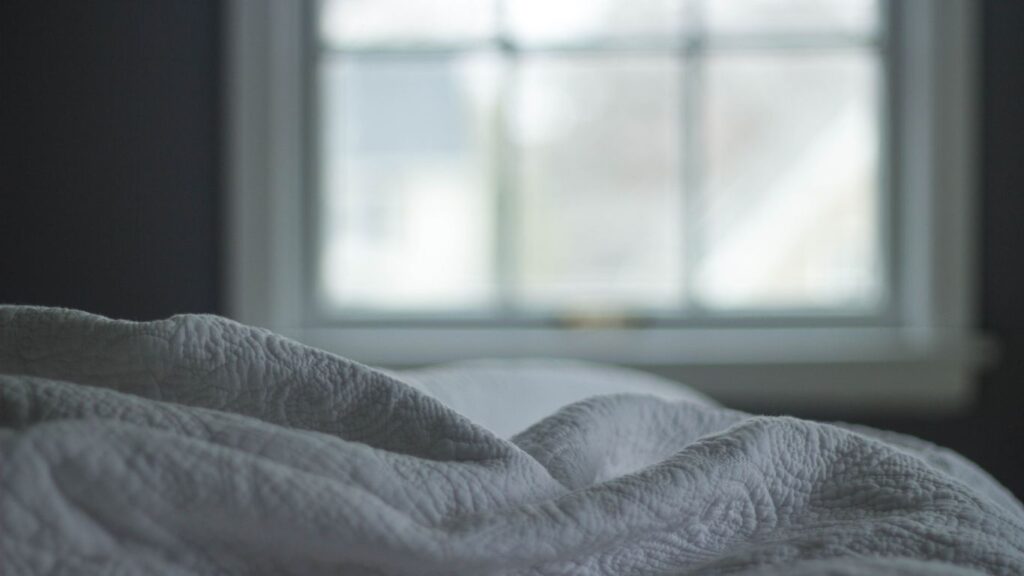Sleep hygiene refers to a set of practices and environmental factors designed to promote restful and consistent sleep. These include maintaining a regular sleep schedule, creating a relaxing pre-sleep routine, and ensuring a cool, dark, and quiet bedroom. Avoiding stimulants like caffeine and limiting screen time before bed also contribute to healthy sleep hygiene.
Maintaining good sleep hygiene is vital because it directly impacts mental clarity, emotional stability, and physical well-being. Proper sleep patterns enhance cognitive function, mood regulation, and immune health, while poor sleep can lead to weakened immunity, increased stress, and greater risk of chronic conditions.
In this blog, we will explore the importance of consistent sleep schedules, relaxing bedtime routines, and the optimal sleep environment. We’ll also address common missteps in sleep hygiene, such as irregular sleep patterns and excessive screen time. Lastly, we will discuss the benefits of improved sleep hygiene for holistic health.
The Importance of Sleep Hygiene
The Importance of Sleep
Sleep plays a crucial role in overall health by influencing cognitive function, emotional well-being, and physical health. During sleep, the brain consolidates memories, processes information, and clears out toxins, all of which contribute to enhanced cognitive function. Adequate sleep sharpens attention, enhances creativity, and improves problem-solving abilities. Emotionally, quality sleep stabilizes mood by balancing stress hormones, reducing the risk of anxiety and depression.
On the physical side, sleep is essential for cellular repair and immune system regulation. Deep sleep triggers the release of growth hormones that facilitate muscle recovery and maintain optimal metabolic functions. A strong immune system is also supported by healthy sleep patterns, reducing susceptibility to illness.
Poor sleep, however, can have adverse effects. Chronic sleep deprivation weakens the immune system, making the body more prone to infections. It disrupts hormonal balance, leading to mood disorders and increased stress. Furthermore, insufficient sleep affects productivity, impairs decision-making, and increases the risk of chronic conditions like obesity, diabetes, and cardiovascular disease.
What is Sleep Hygiene ?
Sleep hygiene is defined as a collection of practices and habits designed to foster improved sleep quality. These practices encompass maintaining a consistent sleep schedule, creating a calming pre-bed routine, limiting caffeine and alcohol consumption in the evening, and cultivating a restful bedroom environment by reducing noise and light. Additionally, sleep hygiene emphasizes the importance of limiting screen time before bed to minimize exposure to disruptive blue light.
Adopting good sleep hygiene habits is directly linked to improved sleep patterns. By sticking to regular sleep and wake times, the body’s internal clock, or circadian rhythm, is regulated, promoting more consistent and restorative sleep. A calming routine before bed prepares the mind and body for slumber, reducing stress and enhancing relaxation. Furthermore, a peaceful sleep environment minimizes disturbances, leading to fewer awakenings during the night. As a result, quality sleep hygiene practices can help individuals fall asleep more easily and achieve deeper, more rejuvenating sleep.
Common Elements of Good Sleep Hygiene

Consistent Sleep Schedule:
Maintaining a consistent sleep schedule, where you go to bed and wake up at the same time daily, is crucial for regulating your internal body clock. This practice helps synchronize your circadian rhythm, making it easier to fall asleep and wake up naturally. Over time, your body learns when to release sleep-inducing hormones and when to trigger alertness, resulting in more consistent, restful sleep. By following a regular sleep routine, you can reduce sleep disruptions, improve overall sleep quality, and feel more energized and focused throughout the day.
Relaxing Bedtime Routine:
Including relaxing activities before bed can help prepare the mind and body for sleep. Consider reading a calming book to shift focus away from daily stressors or practicing meditation to ease anxiety and promote tranquility. Gentle stretching or breathing exercises can release muscle tension, while a warm bath can help lower body temperature, signaling to your brain that it’s time for sleep. These soothing routines, performed consistently, can condition your body to recognize when it’s time to wind down.
Sleep Environment:
Creating an ideal sleep environment involves keeping the bedroom cool, dark, and quiet. A cool temperature helps the body maintain a natural drop in core temperature, which promotes deeper sleep. Darkness signals the brain to produce melatonin, a hormone that aids in falling asleep. Reducing noise levels minimizes disturbances that can interrupt sleep cycles. By ensuring the bedroom is comfortable and free from distractions, you create a sanctuary that fosters restful and uninterrupted sleep.
Limit Screen Time:
Reducing exposure to blue light before bed is crucial because blue light, emitted by screens on phones, computers, and TVs, suppresses the production of melatonin, a hormone that helps regulate sleep. High melatonin levels signal to your body that it’s time to sleep. When blue light exposure is minimized an hour or two before bed, melatonin production is not disrupted, allowing for a natural and timely onset of sleep, promoting better rest and healthier sleep patterns.
Mindful Nutrition:
Caffeine, alcohol, and heavy meals can significantly impact sleep quality. Caffeine is a stimulant that can interfere with falling asleep, especially if consumed in the afternoon or evening. Alcohol may initially induce drowsiness but disrupts deep sleep, leading to frequent awakenings. Heavy meals, particularly close to bedtime, cause discomfort and indigestion, making it difficult to relax. Avoiding these substances in the hours before bed is essential for uninterrupted, restorative sleep.
Common Missteps in Sleep Hygiene

Certain behaviors can negatively impact sleep, making it challenging to achieve restful slumber. Irregular sleep schedules confuse the body’s internal clock, or circadian rhythm, making it hard to fall asleep and wake up at consistent times. Excessive napping during the day, particularly late afternoon or early evening naps, can leave you too alert to sleep well at night. Overusing electronic devices close to bedtime exposes you to blue light, suppressing melatonin production, which is crucial for falling asleep.
Misconceptions about sleep aids and caffeine consumption can also affect sleep quality. Over-the-counter sleep aids may offer temporary relief but can disrupt the body’s natural sleep patterns with prolonged use, leading to dependency or reduced effectiveness. Similarly, the belief that caffeine consumption only impacts those sensitive to it is misleading. Even moderate amounts of caffeine can linger in the body for hours, potentially preventing deep sleep. Limiting caffeine intake to earlier in the day and practicing good sleep hygiene can help ensure a restful night’s sleep.
Benefits of Maintaining Sleep Hygiene
A good night’s sleep offers significant benefits for mental clarity, emotional stability, and physical health.
Enhanced Mental Clarity:
Sleep plays a critical role in cognitive function by supporting memory consolidation, focus, and problem-solving abilities. During deep sleep, the brain processes information and solidifies learning, enhancing the retention of new skills or facts. Adequate rest sharpens concentration, allowing for better decision-making and productivity.
Emotional Stability:
Consistent, quality sleep aids in mood regulation by balancing stress hormones like cortisol and maintaining neurotransmitter levels. This hormonal equilibrium helps reduce the risk of anxiety and depression, fostering a sense of emotional stability. Sleep deficiency, on the other hand, can amplify emotional responses, leading to increased irritability and stress.
Physical Health:
Sleep is essential for repairing tissues, reducing inflammation, and boosting the immune system. A full sleep cycle allows the body to recover and renew, which helps lower the risk of chronic conditions like heart disease, obesity, and diabetes. Additionally, sleep impacts metabolism by regulating appetite hormones, such as ghrelin and leptin, contributing to better weight management and overall energy
Tips for Establishing and Maintaining Sleep Hygiene
Creating a sleep-friendly environment and adopting gradual habit changes can significantly improve sleep quality. Here are practical steps to consider:

- Optimize Light and Noise: Invest in blackout curtains to block external light and use earplugs or white noise machines to minimize noise disturbances. Light and sound can disrupt your sleep, so it’s crucial to control these elements.
- Maintain Comfort: Ensure your mattress and pillows provide proper support. Adjust the room temperature to a cool and comfortable level, typically around 65°F (18°C), to help your body relax and naturally prepare for sleep.
- Limit Electronics: Keep electronic devices out of the bedroom to reduce blue light exposure that suppresses melatonin production. Avoid screens at least an hour before bed, opting for soothing activities like reading or listening to calming music.
- Create a Relaxing Pre-Sleep Routine: Engage in relaxing activities like meditation, gentle stretching, or a warm bath to help your body wind down and release tension before bed.
Final Thoughts
Prioritizing sleep hygiene is essential for holistic health and well-being. Consistent sleep schedules, relaxing bedtime routines, and a sleep-friendly environment contribute to improved cognitive function, emotional stability, and physical health. Avoiding sleep disruptors like blue light, caffeine, and excessive noise helps ensure restful and restorative sleep. By adopting and maintaining these habits with persistence and flexibility, individuals can cultivate healthier sleep patterns, resulting in increased energy, productivity, and resilience in daily life.
Also read: Prioritizing Sleep for Physical Well-being: Tips for Quality Rest
